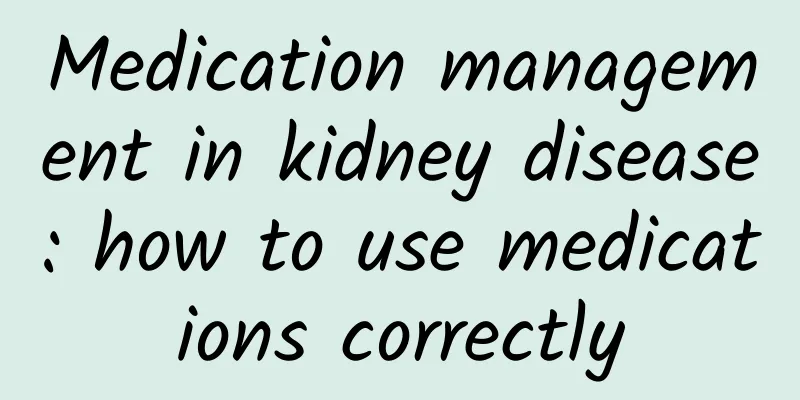Medication management in kidney disease: how to use medications correctly

|
Kidney disease refers to a type of disease that causes kidney damage or failure due to various reasons. The treatment of kidney disease requires comprehensive consideration of the cause, course of disease, complications and individual conditions of the patient to select appropriate drugs and usage. Drug management for kidney disease means that under the guidance of a doctor, the patient takes the drug according to the prescribed dosage, time, frequency and method to achieve the desired therapeutic effect while reducing the risk of adverse reactions and drug interactions. Drug management for kidney disease includes the following aspects: Choose the right medication. Drug treatment for kidney disease should be individualized based on the type, severity, and complications of kidney disease. Generally speaking, drug treatment for kidney disease can be divided into the following categories: ※ Drugs that control the cause of the disease. This type of drug is mainly aimed at the primary cause of kidney disease, such as diabetes, hypertension, glomerulonephritis, etc., to block or slow the development of kidney damage. ※ Drugs that protect the kidneys. This type of drug is mainly used to treat damage to the kidneys themselves, such as proteinuria, glomerular sclerosis, and renal interstitial fibrosis, in order to reduce the burden on the kidneys and delay the decline of renal function. ※ Drugs to correct complications. This type of drug is mainly used to treat various complications caused by kidney disease, such as anemia, water electrolyte disorder, abnormal bone metabolism, cardiovascular disease, etc., to improve patients' symptoms and quality of life and reduce the risk of death. Follow the correct medication method. Kidney disease patients should follow the following principles when taking medication: ※Before taking any medicine, you should read the instructions carefully to understand the effects, usage, dosage, precautions, adverse reactions and contraindications of the medicine. If you have any questions, you should consult your doctor or pharmacist in time. ※When taking medicine, you should follow the doctor's instructions and take it on time and in the right amount. Do not increase or decrease the dose or stop taking the medicine at will, so as not to affect the efficacy of the medicine or cause drug poisoning. If you forget to take the medicine, you should take it as soon as possible, but do not double the dose at the next time to avoid drug overdose. If serious adverse reactions occur, stop taking the medicine immediately and report to the doctor. ※After taking the medicine, you should regularly check your renal function, blood pressure, blood sugar, blood lipids, blood routine, urine routine, electrolytes and other indicators to monitor the effect and safety of the medicine, and adjust the type and dosage of the medicine according to the test results. At the same time, you should pay attention to changes in your own symptoms. If you feel unwell, you should seek medical attention in time. Avoid drug interactions. Kidney disease patients usually need to take multiple drugs, which may cause drug interactions, affect the effectiveness of the drugs or increase the risk of adverse reactions. Therefore, kidney disease patients should pay attention to the following when taking drugs: ※Report all the medicines you are taking to your doctor or pharmacist, including prescription drugs, over-the-counter drugs, traditional Chinese medicines, health products, etc., so that your doctor or pharmacist can determine whether there is a possibility of drug interaction and adjust the type and dosage of the medicine in time. ※Follow the instructions of your doctor or pharmacist, take medications correctly, avoid taking medications that may interact with each other at the same time, or keep a certain time interval between taking to reduce the impact of drug interactions. ※When taking medication, pay attention to the interaction between medication and food, avoid taking foods that may affect the effectiveness or safety of the medication, or adjust your diet appropriately before and after taking the medication. ※ When taking medication, pay attention to the interaction between the medication and beverages, avoid taking beverages that may affect the effectiveness or safety of the medication, or appropriately control the amount of water you drink before and after taking the medication. |
<<: If a child is sick, should he or she take antibiotics?
Recommend
Can I exercise during my menstrual period?
Women who pay more attention to health will exerc...
10 Nutritious Vegetables for White and Soft Skin
Vegetables are an indispensable nutrient in our d...
Feeling guilty about eating, drinking and having fun during the Spring Festival? Then you need to learn these methods urgently
Drinking too much, playing cards, and staying up ...
Does donkey hide gelatin contain estrogen?
After women turn 25, the estrogen in their bodies...
What to do if flat warts grow on the breast
I don't know if you have heard of the virus c...
How long does it take to detect pregnancy after a period is delayed?
If young and healthy women have normal menstruati...
How many months is a woman pregnant?
When we watch costume dramas, we don’t usually sa...
Is it easy to have a miscarriage during the 4th to 5th month of pregnancy?
As we all know, early pregnancy is a relatively r...
What are the symptoms of cervical erosion in the elderly
Cervical erosion is a common and frequently occur...
The significance of estradiol in pregnancy tests
Estradiol is a hormone. It is very important to c...
What causes headaches before menstruation?
Women's menstruation is a normal physiologica...
Do I need to hold my urine before follicle monitoring?
Monitoring the development of follicles is also t...
Can I eat pigeons during menstruation?
We all know that the nutritional value of pigeons...
What are the specific symptoms of kidney yang deficiency and kidney yin deficiency in women?
Everyone has heard of male kidney deficiency, but...









